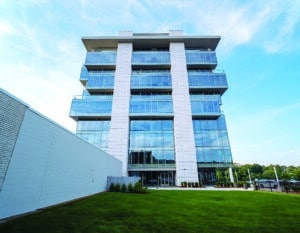
Developer Sal Lupoli’s the Heights at Haverhill opened in 2020. The 42-unit, market rate apartment building is unlike most other residential development in the city so far.
In recent years, the city of Haverhill has been steadily rejuvenating its downtown district with mixed-use developments that have added new residences, restaurants and retail shops to the once-gritty riverfront area.
And more developments are on the way in downtown Haverhill, an officially-designated Gateway City along the Merrimack River on the New Hampshire border.
Boston-based developer RISE Together recently started interior demolition of a vacant 7-story shoe mill on Essex Street, with plans for 40 to 42 residential units with retail space on the ground floor.
Meanwhile, Procopio Cos. is in the final stages of getting approvals for a proposed $100 million mixed-used project, known as The Beck, that would transform a long-vacant factory on the south bank of the Merrimack into a 290-unit apartment complex.
Located across the street from the MBTA commuter rail’s Bradford station, The Beck will also include a new park and serve as a “gateway entrance” into Haverhill’s downtown, officials say.
But those projects are being overshadowed by an even larger venture, the long-awaited redevelopment of the city-owned Goecke Parking Garage and surrounding area just south of City Hall.
A $160 million proposal by the Lupoli Cos. to transform the Merrimack Street garage into a mixed-used complex – complete with 370 market-rate apartments, a restaurant pavilion, retail shops, 616 parking spaces and a new park and plaza – recently beat out four other submissions to tentatively win the right to redevelop the 4.5-acre site.
The Lupoli proposal now heads to the new City Council for final approval.
Milestone Builds on Recent Momentum
Lupoli’s high-profile project would cap a remarkable turnaround for Haverhill, once a thriving mill town churning out shoes and other products before the mid-20th century collapse of the region’s textile industry in general.
The giant project would also serve as another win for those who have long advocated for the revitalization of the state’s so-called “Gateway Cities,” or midsized former manufacturing centers that anchor regional economies in Massachusetts.
“It’s an exciting time for Haverhill,” said Mayor James Fiorentini, who developers credit with implementing a pro-growth strategy to rejuvenate Haverhill’s downtown area. “We’ve heard for years how Rockport and Lowell and other nearby cities have all seen redevelopment. But now this is our time. This is our shining moment.”
Irene Haley, president and CEO of the Greater Haverhill Chamber of Commerce, said she expects more development proposals to emerge in coming years in Haverhill, but the Merrimack Street garage redevelopment does represent a sort of milestone for the city.
“There’s a lot of reasons for optimism in Haverhill,” said Haley. “There’s generally been good cooperation between the city, businesses and the community – and there’s a lot of work still to be done.”

Haverhill officials gave Lupoli Cos. the tentative designation to redevelop the city’s Goecke parking garage property into a $160 million mixed-use complex including 370 market-rate apartments, retail shops and a restaurant pavilion. Image courtesy of Cube 3 Architects
City Reaches for New ‘Heights’
Sal Lupoli, founder and CEO of the Lupoli Cos., is no stranger to Haverhill and nearby communities’ development scene.
His firm opened the Heights at Haverhill in 2020, the gleaming 42-unit apartment building along the Merrimack River that also includes the new Lupoli Family Institute for Culinary Arts. In addition to his development work, Lupoli is also the founder of the Sal’s Pizza chain in New England.
In the past, Lupoli Cos. has developed residential complexes in other Gateway Cities, such as in Lowell and Lawrence, home to Lupoli’s giant mixed-used Riverwalk mill development.
“I’m a big fan of Gateway Cities,” said Lupoli. “It’s satisfying to help communities that need development. There’s a lot of opportunities in these cities.”
Lupoli credits government programs and various other initiatives for helping to redevelop sites in former industrial cities in Massachusetts.
But many of today’s developments in hardscrabble communities are ultimately being driven by market forces – specifically the high cost of housing in Greater Boston, he said.
“Many people are getting priced out of Boston and the Route 128 area,” said Lupoli. “There’s no space to build affordable housing in those places, so people are gravitating out further to [Interstate] 495 and beyond.”
And that means people are moving to, among other places, Haverhill, where its population has been slowly increasing in recent years, from about 59,000 people in 2000 to about 64,000 in 2020, according to Census data.
The year-to-date median price of a single-family home in Haverhill was $451,500 from January through November of 2021, compared to $510,000 statewide, according to data compiled by The Warren Group, publisher of Banker & Tradesman. During the same timeframe, the median price of condominiums was $295,000 in Haverhill, compared to the statewide median price of $455,000.
As for the Merrimack Garage redevelopment, Lupoli said the project is exciting, both for its scope and for the fact it will include a giant “food hall” that will involve an operational partnership between Lupoli’s culinary institute and Northern Essex Community College.
Developers Prefer Clarity from Officials
Other developers in Haverhill agree that market forces – and specifically the state’s red-hot housing market – are ultimately driving major development projects in the region.
But Mike Procopio, chief executive of the Procopio Cos., also credits government programs for helping projects get off the ground, such as the state’s financial help with infrastructure improvements near his firm’s Beck development south of the river.
In addition, he said it’s important for local officials to be clear about what they want and don’t want when it comes to new developments in their communities.
“Developers want clarity,” he said. “The one thing developers don’t want is ambiguities. A lot of times cities don’t even know what they want.”
In the case of Haverhill, Fiorentini has been very clear what can and can’t be done in his city – and it’s helped his company focus, said Procopio.
“We’ve had a good experience in Haverhill,” said Procopio, who targets a start of construction this year and completion by 2024.
Zouk Mo, director of acquisitions at RISE Together, agreed that Haverhill knows what it wants. “They’re trying to get the city back to where people want to work, live and play there. They understand the city needs mixed-use development, he said.”
As for RISE’s 86 Essex Street project, Mo said his firm is hoping to complete the mixed-use venture by 2023.
Afterward, RISE is open to doing more projects in Haverhill, Mo said.
“We’ve gotten calls from other landowners. They’ve taken notice of what we’re doing. We’re weighing all options.”






